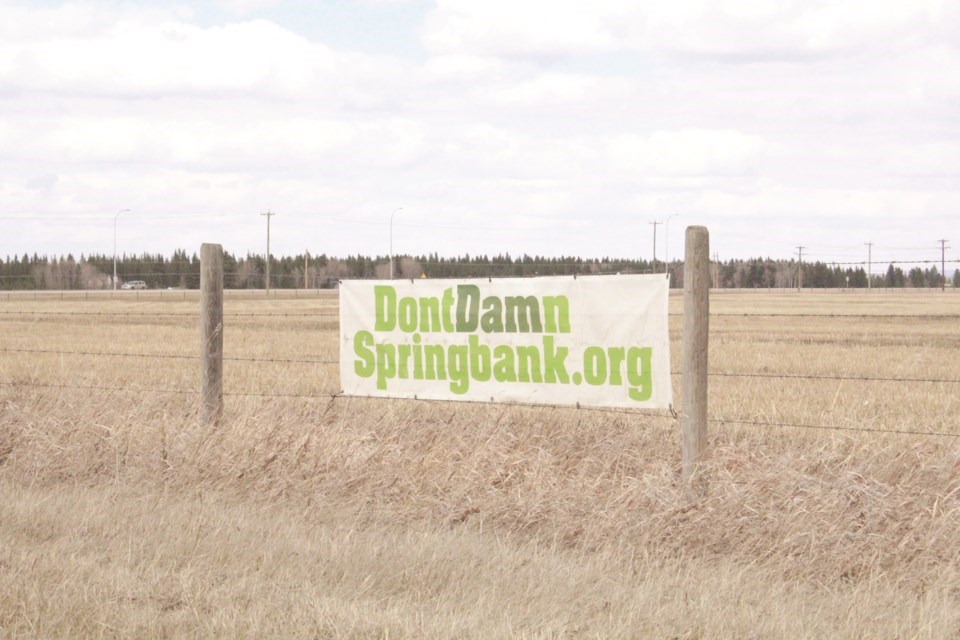A federal agency tasked with assessing the environmental impacts of the Springbank Off-Stream Reservoir has deemed the $432 million dam project would not pose significant risks to wildlife or traditional Indigenous land uses.
The Impact Assessment Agency of Canada (IAAC) released a draft environmental assessment report about the Springbank dry dam in early January. The agency’s report concluded that “taking into account the implementation of the key mitigation and follow-up program measures, the project is not likely to cause significant adverse environmental impacts."
“The proponents’ project planning and design incorporates measures to mitigate the adverse effects of the project,” a portion of the 176-page report states. “These include adherence to existing guidelines and regulations and planning to identify, control and monitor environmental risks.”
The Alberta government initially announced the Springbank-based dry dam project – commonly known as SR1 – in 2014, as a flood mitigation effort in response to the 2013 floods in southern Alberta. The reservoir, which would be located in west RVC and on Tsuut’ina First Nation land, would be designed to help control Elbow River flow rates during a flood and help protect residents and property in RVC and Calgary.
In the event of a large flood, the reservoir would temporarily store water and release it back to the Elbow River in a controlled manner when the flood subsides. The reservoir, which would activate when water reaches 160 cubic metres per second, is designed to store up to 77.2 million cubic metres of water.
While the City of Calgary has been in favour of SR1, the provincial government project has received backlash from other stakeholders over the years, including residents in Springbank, Bragg Creek and the Tsuut’ina First Nation. Opponents have cited the rising cost, potential environmental impacts and lack of transparency and consultation from the government surrounding the project.
"The political will behind this project has always been tremendous,” said Karin Hunter, the president of the Springbank Community Association, which has opposed the project over the years. “Is it inevitable? No, I don't think so. The provincial regulator has to look and test if it is in the public good.
"If I ask the question, is this in the public good for Calgary? The answer might be yes – I don't know, as I can think of a bunch of reasons this is terrible for Calgary – but is this in the public interest of southern Alberta? I think it's a no."
Rocky View County (RVC) council initially voted to formally oppose the project in December 2018. However, council voted 6-3 to withdraw its opposition in May 2020. According to a press release from RVC following that meeting, the decision to withdraw objection was made after the Alberta government announced $196.3 million to help continue work on SR1 over the next three years.
The following month, RVC announced an agreement with the Alberta government to receive compensation for any lost revenue should the project be completed. According to an RVC press release, the County would receive $10 million from the provincial government to address any future loss of municipal property taxes on the 3,870 acres of land that would be impacted if SR1 proceeds.
Another former opponent of the project that reversed course last year was the Tsuut'ina First Nation, which announced in April 2020 it would formally withdraw its opposition to the reservoir. In a CBC report soon after, the Nation stated it had received a $32 million grant from the government in exchange for removing its objection to the project.
Banff-Kananaskis MLA Miranda Rosin, whose riding includes Bragg Creek and Springbank, said she was surprised to learn of IAAC's findings.
"While I found it surprising to hear that the Impact Assessment Agency believes it unlikely for the Springbank off-stream reservoir to have any adverse environmental effects on the region, this is good news," she said in a statement. "Some of the primary concerns myself and the residents of the Springbank area have raised over the years have been in relation to the project’s potential harm to air, land, and water quality of the community, so the release of this report is somewhat reassuring."
However, Rosin added she was still disappointed to see the socioeconomic impacts of the project on Springbank, Bragg Creek and surrounding area residents were not addressed.
"I know that for those living in these communities, much remains unsettled after the release of this report and people still feel very concerned," she said. "I'll continue doing my best to ensure those concerns are not only heard, but brought to Edmonton and addressed."
Since SR1 was first proposed, the cost of the project has nearly doubled, as it has moved through regulatory processes at the provincial and federal level. So far, Alberta Transportation has purchased roughly 25 per cent of the land needed for the project.
"Certainly, this project is not getting simpler,” Hunter said. “It was always pegged as being fast and easy, and a quick win, but it's not. One day, I think we'll look back on this project and say it was a complete waste of our land resources, our economic resources and our water resources.”
Hunter said SCA members intend to submit further feedback at a hearing hosted by Alberta’s Natural Resources Conservation Board (NRCB) in March. She added while IAAC’s report may have concluded the project does not pose environmental risks, area residents would still be largely affected.
"We've only ever asked for one thing from the Alberta government, and it's transparency about the social and economic cost,” she said. “It's disappointing that our own County elects to make an agreement with very little transparency, without consultation with the community that is most impacted."
—With files from Chelsea Kemp/Cochrane Eagle
Scott Strasser, AirdrieToday.com
Follow me on Twitter @scottstrasser19


